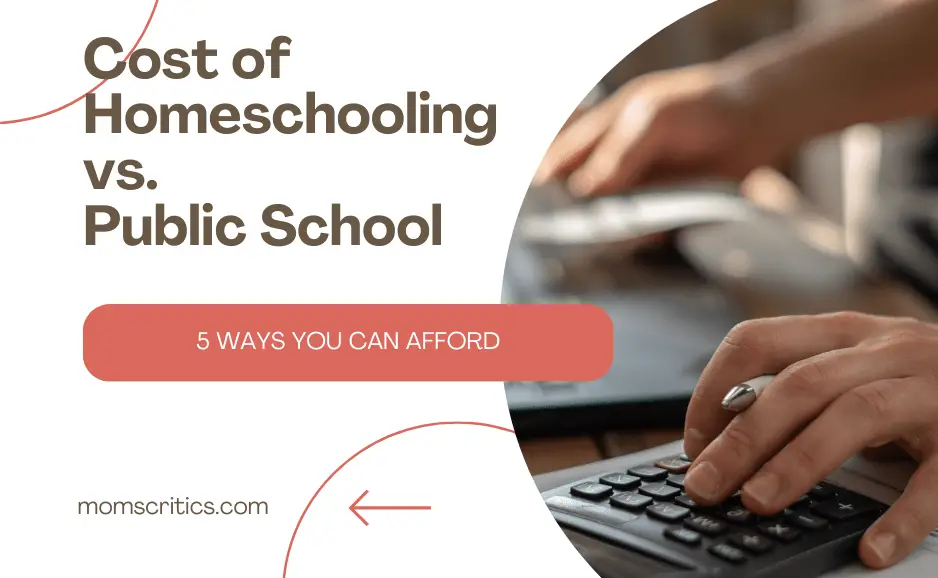Are you thinking about forgoing the public school system? Would homeschooling be a good fit for your family?
This is a wonderful moment for your family even if the decision may feel daunting! You may choose the greatest educational option for your children after considering a variety of possibilities.
To help you make a decision, I’ll list some of the numerous advantages of homeschooling vs. the public school system.
Homeschooling vs. public school
Since some of the language might be unclear, I’ll first clarify the difference between homeschooling and public school. The US government funds public schools which are normally free to attend and provide K–12 education.
The process of teaching kids at home instead of in a regular classroom is known as homeschooling. With this method, parents may customize the curriculum to fit the unique demands and learning preferences of their children.
There are no annual school fees for homeschooling. Annual public school expenses can mount up since several little expenses arise over the academic year in addition to the regular school fees amount.
The education system offered by the government through publicly financed schools is referred to as public schooling. All kids in a certain district or region are eligible to attend these schools.
Public schooling is usually provided at no cost to the student and adheres to a government-established curriculum. It seeks to give every student a good education and equip them for their future academic and professional endeavors.
In addition to being less costly than homeschooling, public school saves parents’ time and effort. They can be released from these duties thanks to the public school. The public can also attend charter and magnet schools, which frequently provide a more demanding curriculum than traditional public schools.
Homeschooling costs vs. public school costs

You might be astounded by the annual gap between the cost of homeschooling vs public school cost. Based on research, the annual cost for a public student is about $13000; in contrast, homeschooling students typically pay between $500 and $600 per child per annum.
Homeschooling is growing in popularity today, and many people are curious about the whole expenditure. Is the cost of homeschooling lower than public school?
There are methods to lower the cost of homeschooling, while public school is not entirely free. Public education is funded by taxes, which makes the cost of homeschooling more than public schools because homeschooling families also have to pay taxes on all of the related expenses.
Some families feel that the benefits of homeschooling outweigh the costs associated with attending a public school or a private school. Additionally, homeschooling may be less expensive than public schooling owing to costs related to public schools and ways to save costs.
Why is homeschooling so expensive?
Homeschooling, compared to public or private schools, can be a little costly and this varies on the families’ goals and preferences.
All of the curriculum, books, materials, and extracurricular activities that a public school would offer are purchased by homeschool families with their own money, time, and resources.
Homeschooling usually means that parents change jobs part-time or quit entirely to monitor the education of their children, unlike public school parents who wouldn’t have to worry about changing jobs to monitor the child.
Hidden costs of homeschooling
A family may save money by homeschooling their child as opposed to paying for them to attend a public or private school.
However, while making a family budget, I advise you to remember that some expenses could be larger or, at the very least, less evident when homeschooling.
The following are some ways that homeschooling might put a strain on family finances:
Curriculum
Some families would rather buy a curriculum, even if it is feasible to assemble one yourself or locate a free one online. On the top end, a single prefabricated curriculum might cost $1,000 or more, which can rapidly add up for families with children in multiple grade levels.
Transportation
Homeschooling does not mean families spend the entire day in the house. Joining a co-op with other homeschooling families, enrolling children in after-school care art programs, or going on field trips may all help broaden learning opportunities and promote social interaction. However, it can also entail paying extra each month for transportation or gasoline.
Supplies
Acquiring materials for home education may include more than just to spend money on notebooks, pencils, and markers. For example, to do scientific laboratory work, families would need to buy a microscope and other school supplies. Or, to finish practical undertakings, they might need to buy resources for arts and crafts.
Food
Children enrolled in public schools or private school students may qualify for school lunches, based on the policies of their state. However, if having children at home throughout the day means eating family meals or snacks more frequently, this might increase shopping expenses for families.
How do parents afford to homeschool?
I will state below how parents can homeschool at a lower cost:
Curriculum
In addition to creating their curriculum with free resources like public libraries, educational applications, and internet videos, parents may find a plethora of low-cost or free homeschool curricula accessible online.
Co-ops
Gatherings of other homeschool families that share curriculum, resources, and teaching duties are known as homeschooling families. Savings on extracurricular and educational activities (e.g. taking educational field trips) can be achieved by participating in these cooperatives.
Second income
To afford homeschooling, some families choose to have a second source of income. Others decide to work from home or part-time so they may have greater schedule flexibility.
Tax-breaks
As previously indicated, several states provide tax exemptions or breaks for homeschooling-related costs, which might assist in defraying the initial cost of homeschooling.
Grants and scholarships
Families that homeschool can also apply for grants and scholarships to help with the expense of homeschool curriculum, supplies, and extracurricular activities.
Is homeschooling a tax write-off?
Perhaps you’re wondering if there are any tax breaks offered by the federal government to homeschooling families to assist them in covering some of their expenses. Sadly, the response is no. However, State-level exceptions exist where homeschooling families may be eligible for tax breaks or other advantages. The states include:
- Indiana: paying out-of-pocket for homeschooling expenses may qualify Indiana households for a $1,000 annual tax deduction.
- Illinois: for qualified homeschooling parents, Illinois gives the Education Expense Credit, which has a maximum annual value of $750.
- Louisiana: for homeschooling families, the state of Louisiana provides a significant tax break of up to $5,000 per pupil.
- Minnesota: families that homeschool in Minnesota might be able to lower their annual tax bill by taking advantage of tax credits or tax subtractions.
Refusing to pay state and local taxes that support public schools is not an option for families that homeschool.
Is there a downside to homeschooling?
Similar to any other teaching method, homeschooling has some possible disadvantages that I recommend you should take into account before determining if it’s the best option for your family.
Limited peer social connection, potential gaps in subject matter competence, and the requirement for parents to assume a large degree of responsibility for their children’s education are some potential drawbacks of homeschooling.
Additionally, parents who are already balancing a lot of other duties may find it difficult to homeschool since it may be a very time-consuming and stressful process. It’s important to remember, though, that these disadvantages are not always present and may be lessened with appropriate preparation and assistance.
In the end, your family’s particular requirements and circumstances should be carefully considered before deciding whether or not to homeschool.
What are pros and cons of homeschooling?
Below are the pros and cons of homeschooling:
Pros of homeschooling
- Flexible schedule and curriculum
- Individualized attention and personalized teaching methods
- Increased chances for hands-on and experiential education
- Stronger family bonds
- Safe learning environment
- No negative peer pressure and bullying
- No compulsory camps or field trips
Cons of homeschooling
- Limited socialization and peer interaction
- Parental time and commitment
- Educational gaps
- Criticism and social stigma
- Lack of accreditation
- Limited access to extracurricular activities and resources
What is the success rate of homeschooling vs. public school?
On nationally standardized achievement exams, homeschool children in this research averaged in the 85th percentile, whereas the public school students scored in the 50th percentile.
According to this survey, on average, homeschooled students outperformed their public school students by 30 to 37 points in every subject.
It is noteworthy to acknowledge that success rates are contingent upon the specific student and their particular circumstances.
Conclusion
Although there are a variety of reasons many families decide to homeschool, controlling expenses is one of them. Budget-conscious homeschooling is feasible, but it does take some preparation to identify areas where money may be saved.
Being a homeschooling parent is a big responsibility that you shouldn’t embark on blindly. Make sure it’s the right decision for your family so you can stick with your decision through the good times and the bad.
When evaluating your alternatives for homeschooling, I advise you to take into account your children’s unique learning styles as well as the time and money you can afford to dedicate to their education.

Keira Addison is a mother pursuing homeschooling for her kids for decades. She loves sharing her experience and practical advice about homeschooling, which has made her a popular authority on the subject. As a professional author, Keira knows how to communicate clearly and effectively with her audience, making her an ideal source of information for anyone considering homeschooling their children.

